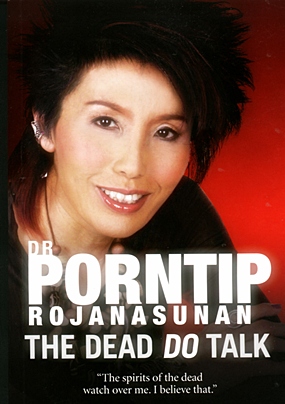The Dead Do Talk is an autobiography (ISBN 978-981-4302-73-9, Marshall Cavendish Editions, Singapore, 2011) written by the highly regarded Thai forensic pathologist, Dr. Porntip Rojanasunan. Dr Porntip is the lady by whose spiky colored hair she is recognized everywhere. However, after reading this book you will find there is much more to this enterprising woman than her coiffeur.
She begins by saying, “I have never thought I am particularly smart. But I was always taught to be conscious of Buddhist doctrine, to follow Dharma and observe religious precepts.” Even more pointedly she writes in the preface, “I strive to be true to myself, to be who I am and not let society or other pressures change me or divert me from my course.”

Her upbringing was strict and she was not born with a silver spoon in her mouth, but earned money selling textbooks and hand-made handbags to get her through her medical undergraduate years.
The autobiography is very frank and personal and she details immature ‘love’ attachments and how she eventually learned to deal with these, and subsequent rejections. And more importantly, how she managed to get her head straight at the same time. Her frank expose of herself continues in the chapter where she looks at what branches of medicine she would head towards. Anesthesiology was rejected because, “… you always had to wear hair protectors and you couldn’t wear make-up – all that would impinge on the way I dressed.”
She discusses, in one chapter, her fight against cancer – not one but two and how this affected her emotionally, and again how she drew upon her Buddhist faith to come out on top.
A great believer in the Zodiac, she even applied the signs of the Zodiac to her future husband to ensure compatibility. This I personally found rather odd for such a highly qualified woman, but beliefs can co-exist with science, or can do in Dr. Porntip’s case.
She writes of the problems experienced in setting up the Forensics Institute and the lack of cooperation experienced at times from the police, and details instances where it is quite obvious that the police had overstepped their brief.
Problems abound in the way investigations are carried out, and Dr. Porntip is convinced that abuse of powers by police is one of the reasons there are more than 10,000 unidentified corpses each year in Thailand. A monstrous figure. DNA testing which is used overseas has been studied, but yet she is having problems with its acceptance and has had further problems where testing results can be “changed’ with money changing hands. Corruption appears to be endemic at all levels of government and public service.
Specific cases are mentioned, such as the Hangthong ‘suicide’, which according to forensic evidence was much more likely to be murder. However, this was denied by the police. She also mentions the disturbing Tak Bai incident in the south of Thailand and the official cover-ups and the problems she encountered with identifying victims of the tsunami. In many ways this is a very disturbing book.
The RRP in Bookazine was B. 530.




